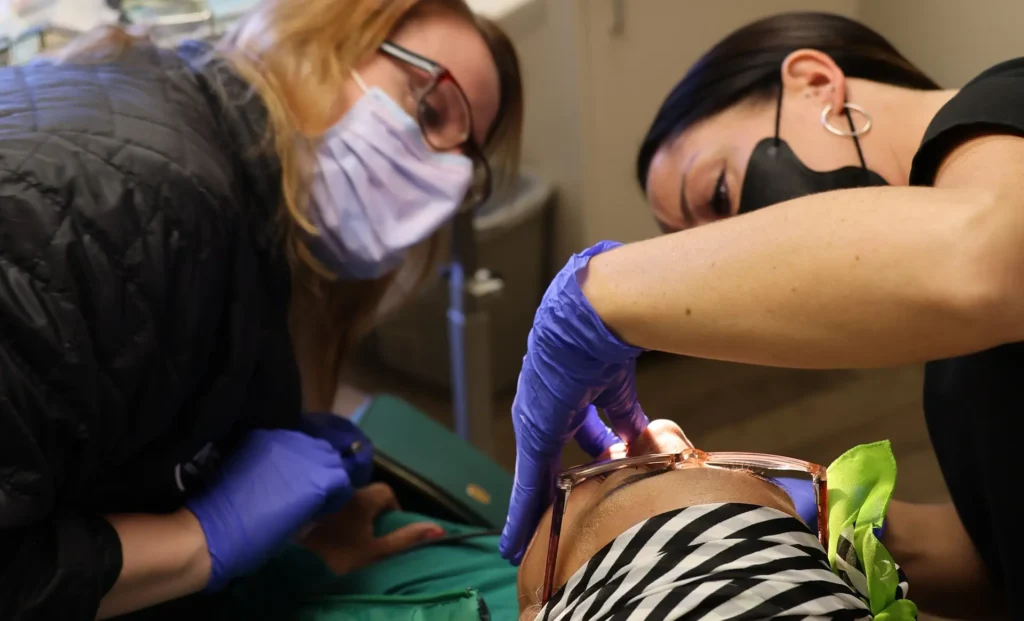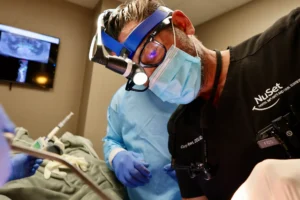You might wonder if it’s safe to get an MRI when you have dental implants. It’s a common concern, especially since MRIs use strong magnets. The good news is that most dental implants are made from materials like titanium and zirconia, which don’t react to magnetic fields. This means MRIs are generally safe if you have dental implants.
Let’s discuss why most implants are safe for MRIs, what you can expect during the scan, and how to prepare. Understanding these basics can help you feel more comfortable and confident if you ever need an MRI.
Key Takeaways
- Dental implants are typically made from titanium or zirconia and are safe for most MRIs.
- Inform your doctor and MRI technician about your implants for the best experience.
- If your implant is near the scan area, your technician may adjust settings to minimize distortions.
- Alternatives like CT scans or X-rays are available if MRI concerns arise.
Dental Implant Materials and MRI Compatibility
Most dental implants are made from materials that don’t react to magnetic fields. Titanium and zirconia are the most common materials used, and both are safe for MRI scans.
Titanium, in particular, is a strong metal that doesn’t interfere with MRI machines, making it a reliable choice for implants. Zirconia is also popular and non-magnetic, meaning it won’t cause issues during an MRI.
You may worry about older or unusual implant materials. While most implants are MRI-safe, it’s a good idea to confirm the type of material in your implant. If your implant is older, your dentist can help identify the material and discuss any possible concerns. In almost all cases, modern implants made from titanium or zirconia are completely safe for MRI procedures.
What to Expect During an MRI with Dental Implants
Getting an MRI with dental implants is usually straightforward. The MRI machine uses strong magnets to create images of your body, but because most implants are made from non-magnetic materials like titanium, they won’t be affected. You can expect the scan process to be the same as it would be without implants.
Sometimes, dental implants might cause very subtle and slight image distortions, called artifacts, in areas close to the implant. This doesn’t usually affect the overall quality of the MRI, but if the scan focuses on a nearby area, let your doctor know. They may change the settings to reduce any effects from the implant in order to get the clearest images possible.
The MRI technician will be aware of your dental implants and will ask you a few questions about them before starting the scan. If they need to adjust any settings, it’s simply to make sure they get the best possible images. This way, you can feel confident that both your safety and image quality are a priority.
Key Steps to Take Before Your MRI

Before your MRI, tell your doctor and MRI technician about your dental implants. Sharing this information helps them prepare and ensures a smooth experience. They may ask what type of implant you have or when it was placed, so feel free to bring any records from your dentist if you have them.
You don’t need to do anything special to prepare for the MRI, but it’s always a good idea to double-check with your healthcare provider if you have specific questions. They can explain any steps they might take to work around the implant, especially if it’s near the area being scanned.
In rare cases, if your implant could affect the scan, your doctor may suggest an alternative imaging option, like a CT scan. Most of the time, however, an MRI is perfectly safe, and these precautions are just to give you peace of mind.
Are There Alternative Imaging Techniques for Dental Implants?
If you’re worried about getting an MRI with dental implants, there are other imaging options. While MRI is safe for most implants, alternative methods are also available if you feel more comfortable with them or if your doctor needs a clearer view.
Here are a few common alternatives:
- CT (Computed Tomography) Scan: This scan uses X-rays to create detailed cross-sectional images. CT scans don’t use magnetic fields, so they’re completely unaffected by implants.
- X-rays: These are often used for dental evaluations. They provide a quick and clear look at teeth and bone structure. They’re ideal for routine check-ups and don’t interact with implants.
- CBCT (Cone Beam CT): A special type of CT scan that focuses on dental areas. CBCT gives detailed images of your teeth, jaw, and implants without any magnetic fields.
Each of these options has its uses, so discuss them with your doctor to find the best fit for your needs. Alternative imaging can help you feel at ease while still providing clear and effective results.
Contact Us at NuSet For Your MRI-Safe Dental Implants
Most modern implants, including those made from titanium or zirconia, are completely safe for MRIs. By sharing your implant information with your healthcare team and knowing what to expect, you’re taking the right steps toward a smooth and stress-free experience.
At NuSet Dental Implant and Oral Surgery, we’re here to make your experience easy and stress-free. If you have any questions about your implant or how to prepare for an MRI, our team is ready to help. Your comfort and confidence are our priority, and we’re committed to supporting you every step of the way. Contact us now to get started!
Frequently Asked Questions
Is it safe to have an MRI with dental implants?
Yes, it is generally safe to have an MRI with dental implants. Most modern dental implants are made from materials like titanium and zirconia, which do not react to magnetic fields.
Is dental work safe for an MRI?
Dental materials commonly used today are non-magnetic, meaning they won’t interfere with the scan. Your healthcare team can address any specific concerns if needed.
What surgical implant may disqualify a patient from receiving an MRI?
Some surgical implants with magnetic or metal components, like certain pacemakers, cochlear implants, or metal aneurysm clips, may be affected by MRI. These implants may require special MRI protocols, or in some cases, they may prevent a patient from undergoing an MRI altogether. Always discuss any implants with your healthcare provider before scheduling an MRI.
Does metal in teeth affect MRI?
No, typical dental metals used in crowns, fillings, and implants do not interfere with MRI scans. While they are safe, they may cause minor artifacts or distortions near the metal, but this usually doesn’t affect the scan quality. Your MRI technician will be aware of this and can adjust the scan settings if needed to minimize any effects.





